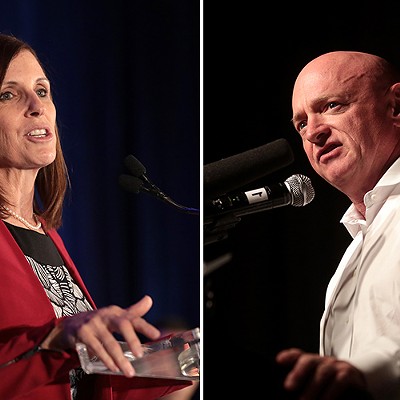Last week's skirmish in the battle between Congressman Ron Barber (D-CD2) and Republican challenger Martha McSally focused on the War on Women.
The War on Women was the catchphrase that captured the many things that Republicans said during the 2012 campaign that drove women in the direction of Democrats. Missouri GOP Senate candidate Todd Akin talked about how "legitimate rape" rarely resulted in pregnancy; Indiana GOP Senate candidate Richard Mourdock said that "God intended" a pregnancy that resulted from rape to explain his opposition to abortion in cases of rape or incest; and here in Arizona, GOP state lawmakers passed a series of bills to limit abortion rights and block federal funds from reaching Planned Parenthood. (Many of those state laws were blocked by the federal courts.)
Tagging Republicans as hostile to women has been a winning strategy for Democrats—and so Republicans have countered by arguing that Democrats are waging the real war on women because the economy is so lousy that girls can't get jobs.
The Democrats have their own workplace-themed campaign on the War on Women—and it circles around whether women get paid less than men. One key statistic in that argument is a U.S. Census statistic that shows when comparing overall median salaries of fulltime workers, women earn 77 cents for every dollar that men earn.
When the Obama administration rolled out that statistic in support of a proposed Paycheck Fairness Act, the American Enterprise Institute crunched the data and discovered that in the Obama White House, women earned 88 cents for every dollar that men earned.
The White House defended itself by saying that men and women in similar jobs earned the same pay and the mean salary statistic was thrown off because women held many of the lower-paying jobs at the White House, according to The New York Times.
When Barber used the same 77-cent statistic in an Arizona Daily Star op-ed in support of the Paycheck Fairness Act, the National Republican Congressional Committee pounced with a spreadsheet that showed that, based on the formula that Barber mentioned, women in Barber's office were earning 84 cents for every dollar that a man earned.
The statistics were noted in an NRCC press release last week that declared Barber to be "nothing more than a disingenuous hypocrite."
Team Barber responded with facts of their own: His three most highly paid staffers are all women and of the 21 full-time workers in his office, 13 are women and eight are men. Their calculation salary of the office showed that women earned a median salary of $45,744 a year, while men earned a median salary of $39,870.
"Ron Barber is committed to hiring and promoting women, and paying them equally to men," Barber campaign spokeswoman Ashley Nash-Hahn said. "Over the past two and a half years, Ron has hired women to work as his campaign manager, chief of staff, district director, legislative director, and more. The three highest paid workers in Ron's Congressional office are each women."
The attack on Barber was telegraphed a few weeks earlier by McSally herself, who told the Pima County Republican Club: "Ron Barber says he supports women. He said he supports equal pay for equal work. Using the same math, though, that he is saying there is a problem with, using that same math, do you know that in Ron Barber's own office, he pays women 84 cents on the dollar for men. ... This is hypocritical! This is a guy who said something to women behind him to get reelected and now that push comes to shove, he's a part of the problem."
Contacted last week as to where those stats came from, MsSally spokeswoman Kristen Douglas directed the Weekly to the NRCC.
NRCC spokesman Daniel Scarpinato said that he'd applied a strict reading of the formula and crunched the data to come up with the statistics for Barber's office. He conceded in an email that the calculation was based on "a silly formula that doesn't take into account important factors—but Barber is the one touting it in the largest media outlet in his district."
In a subsequent conversation, Scarpinato said the outcome within Barber's office was part of the point he was trying to make: The 77-cent statistic that Barber cited isn't a particularly good way to measure how well women fare in the workplace compared to men.
"Rather than keep making things up, Barber should just be honest that he's not living by the same rules he's saying others should live under," Scarpinato said. "Hopefully, now Barber will think twice before quoting statistics and formulas he hasn't researched, and that he himself isn't even following."
Barber campaign spokeswoman Ashley Nash-Hahn said that it was "clearly ridiculous to compare the methods used in a large-scale report like the Census to something small, like Ron's office, or any office. But no matter which way you slice the data, there's a gap in earnings between men and women and that has real consequences for families."
There have been other studies that have revealed a pay gap. In a Slate article that was skeptical of the standard 77-cent figure, Hanna Rosin zeroed in on a study that showed that controlling for a variety of factors, women were earning about 91 cents for every dollar that men made.
"The point here is not there is no wage inequality," Rosin wrote. "But by focusing our outrage into a tidy, misleading statistic we've missed the actual challenges. It would in fact be much simpler if the problem were rank sexism and all you had to do was enlighten the nation's bosses or throw the Equal Pay Act at them."
And that brings us back to legislation designed to reduce the pay gap. When it comes to the fundamental policy question regarding whether Congress should pass the Paycheck Fairness Act, Barber and McSally actually agree that they both support the bill.
Barber is a co-sponsor of the legislation, which has stalled in the GOP-controlled House. And McSally told the Weekly she would vote in favor of it as well.
Of course, even when they agree, the candidates find a way to disagree.
"As someone who has fought for women my entire life, I know first-hand that women are still not treated equally in the workplace, and if I was in Congress, I would vote for the Paycheck Fairness Act because it's the right thing to do," McSally said via email. "Unfortunately, because of Congressman Barber's failed leadership and continued support for job destroying policies, women in Southern Arizona are struggling economically like never before. Sometimes the 'best man for the job' to fight for women is a woman. When I replace Congressman Barber, I'll wake up fighting for women in this community everyday."
That brought a sharp retort from Team Barber's Nash-Hahn.
"Glad to see McSally take her finger out of the wind and actually take a position on an issue," Nash-Hahn told the Weekly via email. "Hopefully we will see McSally come out of hiding on the other issues important to women. She should join Ron Barber in opposing Paul Ryan's reckless plan to raise taxes on working women--which she told us she would vote for. She should also join Ron in supporting a woman's right to choose. Fortunately for us, with Ron, we don't have to guess about where he stands. He comes out and tells us in plain English, without excuses."











